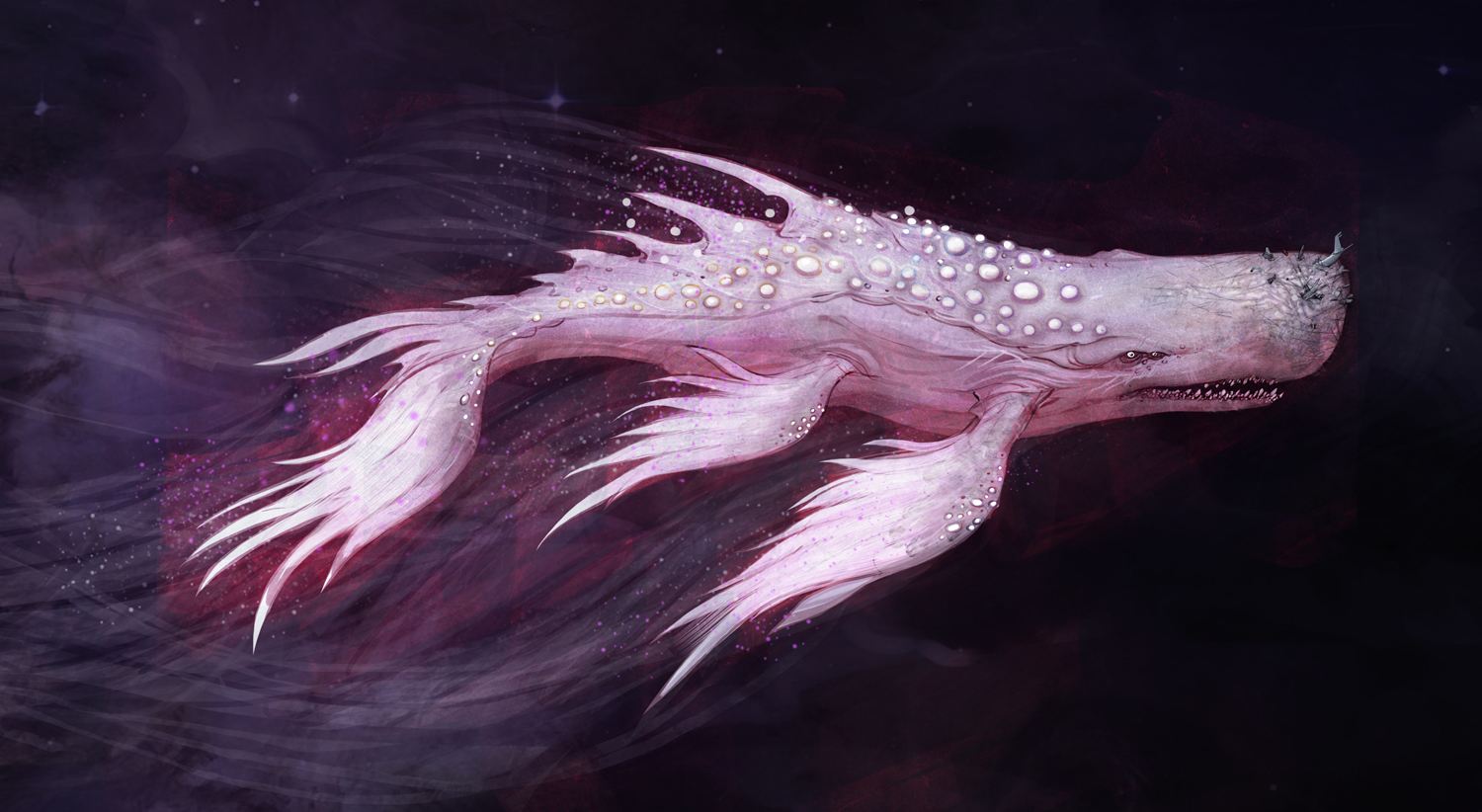The Equestrian Bestiary: An A-Z
Chapter 17: Leviathan
Previous Chapter Next ChapterLeviathan
Threat Classification -- 1/5
Rarity -- 3/5
Physical Description: Leviathans are a peculiar creature that resemble whales in appearance. However, unlike their seafaring counterparts, leviathans ‘swim’ the skies. They are as large as blue whales, stretching anywhere from 90 to 100 feet in length; however, they weigh significantly less, averaging at only about 350000 pounds.
Their colouring ranges from deep blues to grey-whites, with most individuals being darker on top and lighter on bottom. Their general body shape is as a basic whale with the inclusion of incredibly long and powerful wings where a whale’s pectoral fins would be. Furthermore, they possess a unique type of feather on their tail, far larger and stiffer than pegasi or bird feathers. These feathers are always a brilliant white and loose feathers are occasionally found on the ground, treasured by collectors as gorgeous works of art.
Scientifically speaking, it is impossible for such things to create enough lift for the creatures--it is theorized, then, that they possess some immense latent magic that allows them to fly and float through the sky. Whether this is similar in nature to pegasi latent magical ability is still under research.
One of the most noticeable and memorable traits of a leviathan are the eyes. While relatively small, observers have noticed a calming sense of amusement and vitality when looking into a leviathan’s eye. Colours are most often deep purples and blues. It has been suggested these creatures are incredibly intelligent and peaceful and take some sort of entertainment or pleasure out of the observations of smaller beings.
Leviathans live for several hundred years, with some reports claiming leviathans older than 1000 years existing. They mate very rarely--only every hundred years or so. Pair bonds are formed for life, with the pair and the entire group helping to raise the young. Most typically a pair will have one calf, with the rare twins being born occasionally. When birthing a calf, the male will fly underneath the female in order to catch it, as it can not fly until one year of age. Specimens come of age at around 70 years old.
Abilities and Comparison: Ignoring their ability to fly, leviathans possess no known abilities of any kind. Their innate magic must be incredibly powerful, however, to keep so much weight aloft so easily and at all times. It is unknown whether this is somehow taught to calves, or if it merely takes time for the magic to ‘build up’, but leviathans under one year of age can not fly and simply ride upon family members’ backs.
Young leviathans are agile and swift--flying is more about play than simply travel for them. Their flying abilities rival the best of pegasi until they grow older and larger, when they can no longer pull off the spectacular stunts of their youth.
Behavior: Leviathans are incredibly docile creatures. They fly through the air in large family groups of up to several thousand members, often avoiding areas of pony habitation. However, it is a common pastime of pegasi to either fly with them or even ride upon smaller leviathans--interestingly enough, reports seem to suggest that the leviathans respond positively to such activities.
Due to their size and tendency to group together, leviathans possess no natural predators or threats and therefore have never been seen to express violent behavior of any sort.
Young leviathans often form a group within the group--playing and performing tricks with one another while they are still small and agile enough to do so. Older leviathans seem happy enough to simply fly from place to place--leviathans do not stop flying for any reason, even sleep.
Habitat and Diet: Leviathans seem to have no habitat per se except simply the sky. The only places they seem somewhat reluctant to go are areas of arctic climate--but even then, they have been seen in such places. Currently, it is estimated there are around four or five different family groups scattered throughout the globe, with the occasional individual member.
Leviathans feast on massive clouds of insects and some magical beasts such as parasprites. In this way, they help contain the pest populations of the globe. Some have even been known to swoop on wings of air gargoyles as of late. It is also theorized that they feast on clouds for moisture, especially thunder clouds. It is unknown why they possess this preference for thunder clouds, though it is jokingly suggested that thunder clouds possess a ‘fizz’, not unlike a soda for a pony.

